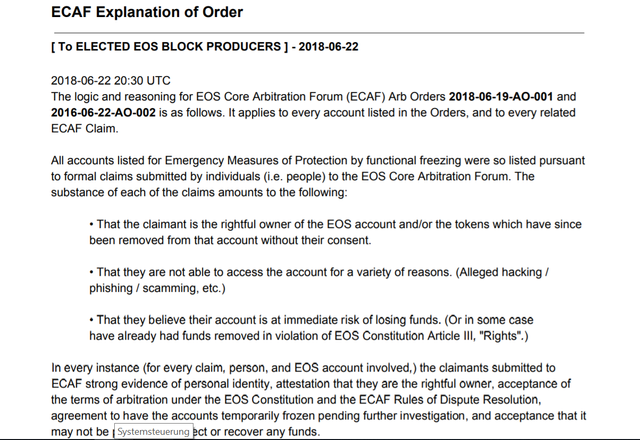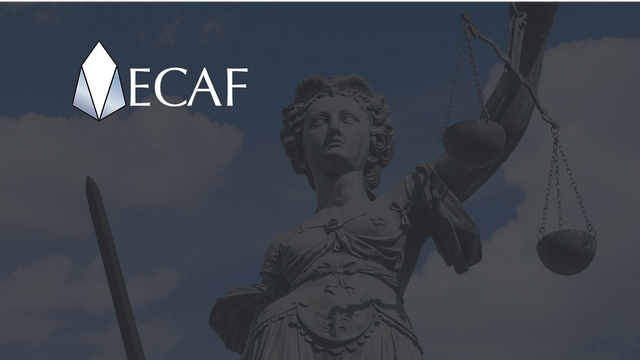EOS - So you are missing the explanation for the frozen acocunts? Read this!
Controversy with EOS just doesn't ebb off. Now many (outsiders?) are enraged with EOS governance finally starting to take action. Especially the emergency order to freeze 27 accounts has provoked an outcry, and the lack of an explanation has been heavily critisised.
While indeed the postponement of the explanation might have been unlucky, now there is an explanation to the ruling available. Take a look and see if your criticism holds up.
In a nutshell:
- The arbitration claim came from the proprietors of the frozen accounts. Third party accounts haven't been frozen.
- Those people were able to demonstrate ownership, as the were able to provide the ETH primary keys that have been used for the ICO:

(The doc has been publishen in the EOSGov Telegram Channel, June 22, 22:49 CET.)

Ethereum reverted transactions in the past when a large hack occurred. They had to stop the whole chain and go back to the previous state. I don't see freezing hacked accounts as a problem, rather a feature offering safety of users' funds and detracting hackers from trying to run expensive malicious campaigns (cheaper and more effective to scam from other blockchains' users).
My only condition would be that Block Producers hold a considerable amount of EOS, so they always have a lot to lose if they behave unethical. The more EOS they have at stake the more credible they are.
Very valuable point added! Special thanks for the resteem!
Thank you for that explanation @voluntary-io. It's definetly helping me to put some puzzle's together.
cheers, Piotr
My ONLY problem with this is that they didn't provide reasoning. Providing reasoning at a later date is just a dangerous precedent. We need to outline these kinds of procedures in the Constitution and vote out the idiot who decided that was going to be good PR.
Absolutely agree they need to get much more transparent and professional, but still, this forum is just a few days old now (politicians get 100 days), and they also don't get paid. And finally this has been an emergency ruling, so it makes sense to act now and deliver a bullet-proof reasoning later, which they did within 2 days. Compare that with any other blockchain, your precious tokens would have just been gone. Forever! Without reasoning ever.
great choice of topic @conceptskip. this is indeed a little heated up issue.
it seem that EOS is struggling with several problems one after the other. and probably most investors do not even understand some of those problems (I seem to belong to this group).
upvoted. And thx buddy for resteeming my latest post. Hope you can also find some time and participate :)
Yours
Piotr
The thing is, the mainnet just launched, the whole system is only being built up, and there are many piece of the puzzle that need to fit together. Moreover BlockOne who created the tech, have now stepped into the background and the community needs to decide, that's likely the main source of the controversy, because different stakeholder want to steer the project in different directions, as long as its not settled.
Hi @conceptskip-
Im very sorry for such a delay with my replies but currently Ive been overwhelmed with amount of work that has been related to my latest contest. I never expected to receive such an amazing support.
Thank you for your valuable explanation mate.
Enjoy your weekend :)
Yours
Piotr
Ah yes, you are welcome! I always find your posts very inspiring and i hope to add my view on it too.
Let's see what the word "abritration" actually means.
Source
The question is: how does the above definition fit into what is happening on EOS? Is ECAF really acting as an arbitrator or more like police?
Good question, because it addresses some facts about EOS not well known. By using the blockchain, every participant agrees to the constitution and thus arbitration, and as for now no other forum has been defined, ECAF is the default arbitration, just as described by the constitution. So everything is there. And by starting the unstaking process on the nascent EOS blockchain, those scammers, did formally agree to arbitration.
If you are interested in this topic i recommend watching @dan's recent explanations how this works:
In addition: If in fact the arbitration-action would have been illegitimate, one of the current possessors of primary keys of those accounts frozen could have stepped up and dispute the arbitration ruling, but until now only uninvolved 3rd parties have done so.
Yes, I'm aware of this video and it only proves my point.
When you are a citizen of any country, you also agree to the constitution by choosing to live in that country and thus you are subject to its police and justice system, as defined by the constitution, if you commit a crime.
Just stop calling ECAF an arbitration, which in real life is an entity you opt to employ when you enter a particular contract with a third-party.
Instead call it police (combined with a court of law), and everything will be fine.
When you are robbed, you don't have a disagreement with the thief. You are a victim of a crime. You don't need an arbitrator, you need police. So when you're calling ECAF an arbitration, you're twisting the reality to hide the truth.
When you are robbed in real life, you call the police, that makes an investigation, brings the case to a court of law, which issues a verdict which is then implemented by the government.
When you are robbed on EOS, you call ECAF, that makes an investigation, reaches a conclusion, issues a verdict which is then implemented by the BPs.
The analogy is perfect. What we have is a policed blockchain. Is that what we wanted? I don't know.
I wouldn't call it police. Police in that sense would imo be the bps, because it's them to carry out the orders. ECAF rather resembles the court of law. and it might differ from offchain only in that sense, that offchain arbitration exists inside a judicial framework of law. The latter doesn't exist on EOS, so arbitration is the only legal entity we have. But still, its tied into the blockchain, and once you are using it, you are bound to it. you still have the liberty to not do so.
If you are asking me, my answer is a pretty clear:yes, this is exactly what i want, and it is exactly what i expected, since Thomas Cox has described that in length and repeatedly ahead of the launch.
Nope, I'm sorry to say you are missinformed. Police does the investigation and brings the case to a court of law and so does ECAF, which performs both of these roles. It's police and a court of law combined into one entity, which makes it even more formidable.
If BPs can be compared to anything, it's the high court and the executive body (the government) combined but certainly not the police.
I'm not saying a policed blockchain is a bad thing. For me it doesn't make much sense but I guess some people might like it to be taken care of.
But why are you so afraid to use the right word to name it, and hide behind the arbitration phrase?
Nope, the arbitrators don't do any investigation, it's the parties in dispute, which are to bring up evidence, which then is assessed by arbitrators, who publish their ruling. So there is no ground for me to follow your terminology.
What i would be interested in, what would be your suggestion to do better? Letting scammers, hackers and faulty code, put investors at risk? Because that would be the consequence of dropping arbitration?
OK, so in your terminology the thief got into a "disagreement" with the victim, then they contacted the arbitrator who assessed the evidence brought forward by the thief and the victim, and made a ruling.
Sounds like a very solid reasoning.
As I said, I have nothing against police and ECAF. They serve a very important role and I wouldn't want live in a country where there is no police (though I'd prefer a blockchain where there's no police, just voluntary arbitration).
Just stop pretending, call ECAF what it really is, and I'm fine with it. What I'm against is twisting reality to hide the truth.
You got the case totally wrong! In this case it was the victims who contacted the arbitrators. They asked that their accounts are freezed, because scammers have got hold of their EOS keys and used them to unstake their tokens!
Very bad comunication and it's strange you need an eth address to prove the ownership of an EOS account .. What about non genesys accounts?
Is it really strange to look at the eth keys, when the alleged fraud took place on the Ethereum chain?
And no, why should this same procedure be necessary for non genesis accounts, this would be an entirely different case....
Please upvote: https://steemit.com/free/@bible.com/4qcr2i
Congratulations @conceptskip! You have completed some achievement on Steemit and have been rewarded with new badge(s) :
Click on the badge to view your Board of Honor.
If you no longer want to receive notifications, reply to this comment with the word
STOPTo support your work, I also upvoted your post!
Do not miss the last post from @steemitboard!
Participate in the SteemitBoard World Cup Contest!
Collect World Cup badges and win free SBD
Support the Gold Sponsors of the contest: @good-karma and @lukestokes
@conceptskip Hey please help me to join me your community my friend please follow like comment share I hope you like my content plz support me.